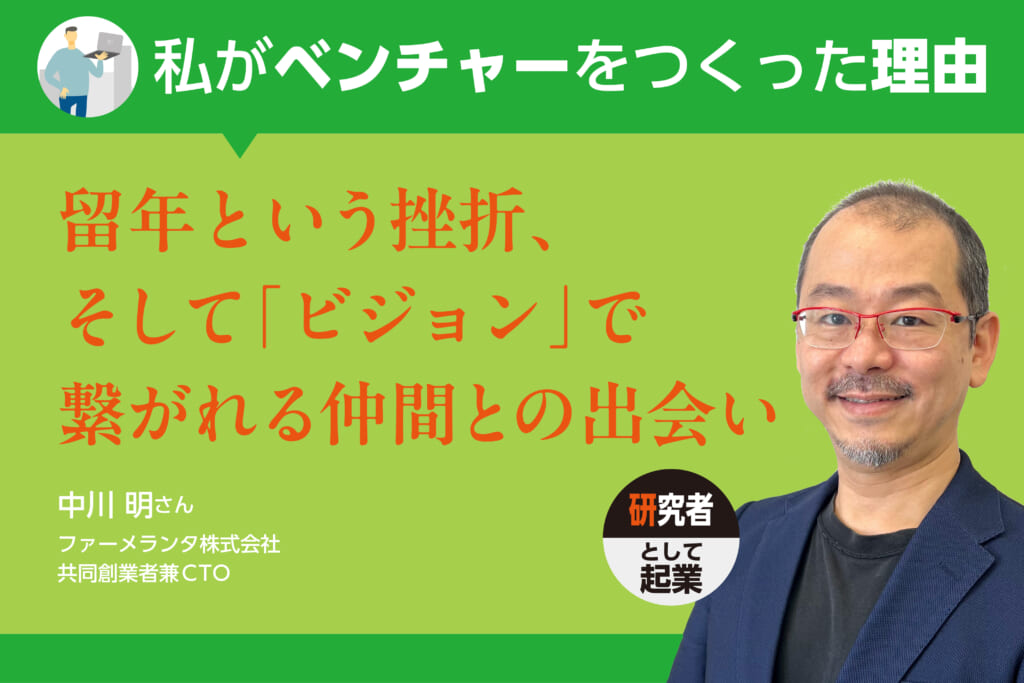- Germination Reactor
<The reason why I created a venture company>After a setback of staying in school, I met friends who were connected by "vision" (Mr. Akira Nakagawa, Farmeranta Co., Ltd.)

What can be done in theory can always be done. Biotech Venture CompanyFarmeranta, Inc.Akira Nakagawa, co-founder of Synthetic Biology, Inc., launched his company in 2022 with the vision of "revolutionizing the industry in the production methods of useful substances through microbial fermentation using synthetic biology. Revolutionizing production methods to maximize the potential of life and creating an ideal research environment that is not bound by existing concepts are the themes that drive Mr. Nakagawa. Late-night discussions in the laboratory lead to new challenges as he becomes a colleague with the same aspirations. We followed the path of such a researcher. (Reprinted from incu-be vol. 67)
Determination to face what you want to do, led by a setback
I thought I could live as happy a life as anyone else with only 30 percent of the effort. I did not want to work hard. What changed Nakagawa's life was the setback of staying in school. One day, when he was feeling down, he saw people living happily at a pachinko parlor and decided to do what he really wanted to do. That opened the way to bioengineering research.
He recalls, "It was the first time I chose a path of my own volition and faced it with all my might, regardless of whether I had 30% of the power or not. After completing his doctoral studies, he worked as a researcher for a company and was involved in applied microbiology research. It was there that he came up with the research he wanted to do. Alkaloid compounds are synthesized by plants through a multi-step reaction process. He thought it would be interesting if he could efficiently produce this useful ingredient using E. coli, and proposed the idea within the company, but his proposal was rejected.
The "Tea Room" where we discussed our research and vision
Six months later, a paper was published that claimed success in producing alkaloid compounds in E. coli. The author of that paper was Hiromichi Minami, who later became co-founder and CSO of Pharmelanta. There was just an opening for a post-doctoral fellowship in Minami's laboratory, and I jumped in with the feeling that "I definitely want to work with Dr. Minami.
The research direction I had in mind was exactly the same as that of Mr. Minami's. I was convinced that I could do my ideal research here," says Nakagawa. I was convinced that I could do my ideal research here," said Nakagawa. In the tea room of the laboratory, they had heated discussions every day until late at night. Gradually, however, he began to feel that his research at the university was not up to the task. He was faced with the reality that the research results he was accumulating were being completed in the form of papers without finding a way out in the form of practical applications. In the course of discussions with Mr. Minami about this sense of challenge, the option of starting a business came to mind. Then, after meeting a fellow manager, he started his own business.

Material production that realizes "it should be possible
The company has succeeded in introducing more than 20 different genes into a single E. coli organism and making them work properly. It is as if an elaborate factory with multiple production lines can produce multi-step enzymatic reactions in E. coli.
The innovation of this technology is that it dramatically improves production efficiency. It is now possible to synthesize rare useful ingredients contained in certain plants, which are used in painkillers and other drugs, using E. coli bacteria without cultivating plants. Furthermore, they have established a technology to precisely control the way genes work so that each reaction works smoothly. This has allowed them to raise the production from a liter of culture to the theoretical limit of grams. Nakagawa says, "I would like to continue to make what researchers think is 'theoretically possible' into a reality.
From individual battles to team battles
Mr. Nakagawa's awareness as a researcher changed drastically when he started his own business. Feeling uncomfortable with research for the purpose of writing papers, Mr. Nakagawa assumed that there were few researchers who could share his ideas and that he would have to follow a solitary path.
However, he and Mr. Minami started their own company and were in a position to recruit researchers. There, they adopted a unique recruitment method. In the employment examination, the applicant is required to read a certain paper and write a report proposing a roadmap to practical application. Rather than the correctness of the solution itself, we place importance on the researcher's approach and attitude toward research, which can be seen from the report.
As a result, the gathering of outstanding researchers changed Mr. Nakagawa's thinking completely. I never thought research could be so much fun. I now strongly feel that an environment where I can conduct research with like-minded people is what I needed," says Nakagawa. Through active discussions, research data is being generated at a faster pace than expected, and new discoveries are constantly being made. Mr. Nakagawa continues to work with his fellow researchers toward the practical application of his research.
(Text by Shiro Takagi)
<プロフィール>
Akira Nakagawa
D. in Bioscience from Nara Institute of Science and Technology (NAIST). He switched from information engineering to the field of life science and became fascinated by DNA information that controls life. After working as a postdoctoral researcher at Kyowa Hakko Kirin Co., Ltd. he became a lecturer at the Applied Microbiology Laboratory, Institute of Bioresource Engineering, Ishikawa Prefectural University (current position). 2022, he co-founded Pharmelanta Co.

